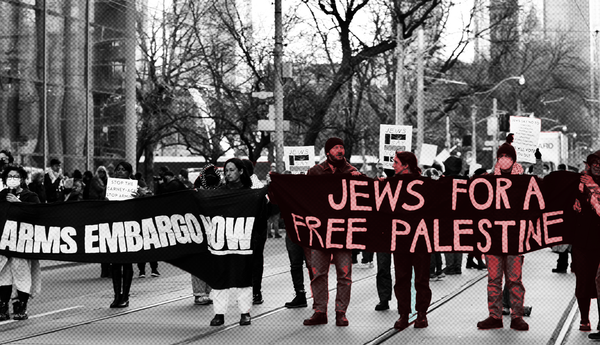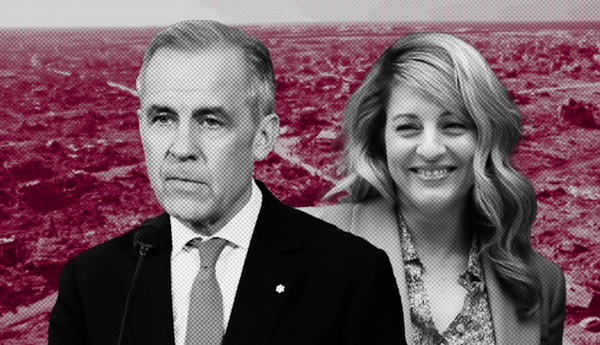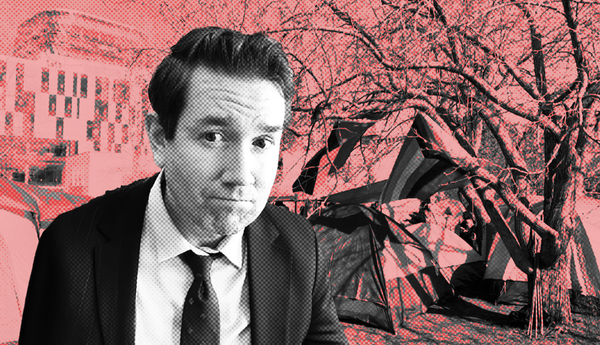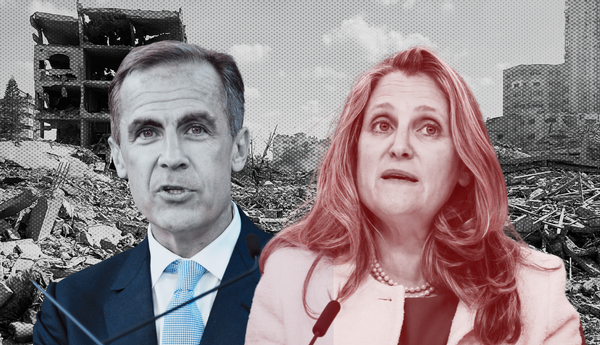On Nov. 17, 2023, Eman, a 28-year-old Palestinian woman living in Cobourg, Ontario, woke up to scroll through Instagram for updates on Gaza, as she had done every morning since October 7.
As she clicked on a video, Eman quickly realized that she was watching something she never wanted to see: Her 26-year-old brother, Ahmed, laying face down on a sidewalk.
His head was blurred, but blood spilling onto the pavement was visible. Eman’s father, Saad, was crouched down beside him, clinging onto a white flag and crying out in Arabic: “I told you — let’s stay at home, my son!”
Eman recognized the street in the Rimal neighbourhood in Gaza City, the place where she’d lived her entire life before moving to Canada in 2015 to pursue a scholarship. In the video, she could hear the voice of their neighbour, Rami, who was filming, pleading: “Let’s carry him. Let’s carry him.”
The red, white and black CNN banner across the video read “Journalist films family’s evacuation from northern Gaza.”
Only Eman’s first name is being used in this story, as she and her family fear harassment as a result of an incident described later in this story.
Re-traumatizing Images
The video Eman saw on November 17 captured an incident that had taken place a week prior.
On November 10, Eman received a call from her sister, Mona, telling her that Ahmed had been shot in the head while trying to evacuate to the south of the Gaza Strip, as the Israeli military had instructed Gaza residents to do.
Saad and Rami had managed to get Ahmed to al-Shifa hospital. Despite his wound, he was still breathing.
The next day, the hospital was besieged by the Israeli military, who claimed, without substantiating evidence, that it was being used by Hamas as a command centre.
Power and fuel at the hospital had run out. Eman got the number for the hospital from her sister and called everyday, trying to get hold of someone. On November 12, she reached a doctor who was treating Ahmed.
The doctor told her to pray. They couldn’t do anything to save him.
Her father was too traumatized to speak to her. Eman reached the doctor again on November 14, who told her that Ahmed had died the day before.
Now, with video footage of Ahmed’s death circulating on social media, her family’s trauma was on display for the world to witness.
By the time Eman saw the video, it had gained over 4.8 million views and over 38,000 shares. “I wanted to tell everyone: Don’t share this video. This is my dad,” Eman said. She’d never seen her father so vulnerable. “It was very hard for me to see my dad’s pain.”
After watching the video, Eman couldn’t eat or drink anything that day. Her husband, Salem, tried to feed her with his hands, but she couldn’t stop vomiting. He took her to the hospital where she was treated for dehydration.
Upon reflection, Eman realized that she’d been sharing similar videos to showcase what was happening in Gaza. This changed her mind about the global attention to her family’s moment of devastation.
“It’s kind of proof for everyone that we have been talking about this for years, and no one listened or believed,” she said. “But now, with all these videos, do you believe?”
In an investigation, CNN geolocated the video and provided the Israeli military with the coordinates and details of what was captured through Rami’s footage. The military did not respond to CNN’s request for comment.
Trying To Live Through The Horrors
Eman is a mother to a two-year-old named Zahid and is currently 19 weeks pregnant. She and Salem work from home as financial analysts, and Eman is also currently studying for her bachelor’s degree in business administration online.
She usually starts her days by trying to reach her family in southern Gaza using the eSIM cards she purchases for them. It typically takes 15 to 20 attempts to get through to her mother and siblings who are living in a tent camp in Rafah.
She can only speak with her father, who is still in northern Gaza, once every few weeks. Throughout the day, she and Salem busy themselves with work and try to distract themselves from thinking about the ongoing horrors in Gaza.
Eating is difficult for Eman. She is much thinner now than she was during her first pregnancy, and makes a conscious effort to fuel her body. She reminds herself, “I have a soul inside me that’s growing.”
Growing up, she and Ahmed were very close. Where she’d go, he’d follow right behind. As they got older, he developed a love for fashion and never left the house without looking well put together.
She loved borrowing his clothes, especially his signature jean jackets and sweaters. Ahmed used to tell Eman that one day, he’d become a professional barber and move to Canada, just like her. “When I eat the foods he used to like, I think of him,” she said. “Sometimes, I feel Zahid looks like him a little bit.”
Eman often tells Zahid about Ahmed and their memories in Gaza.
“He’s still too young to understand everything, but we make sure to tell him: You’re not only Canadian, you’re Palestinian as well,” she said. I asked Zahid where he’s from. It takes a few tries for him to stop replying with “tiger,” his latest obsession, but he eventually looked up at me and said “Gaza!”
Ahmed’s last words to Eman were sent through an Instagram message two weeks before he died. “I don’t know if he felt it or something. But the last thing he messaged me was: Tell me how you are. How are Zahid and Salem? Take care of yourself and your family.”
Eman struggles the most at night. Seeing footage on social media of the streets she roamed as a child now turned to rubble makes her feel like she’s lost a part of herself.
Guilt creeps in knowing that she has a shower and a warm bed while her family suffers. “[Israel is] not only destroying our life; they’re destroying our memories,” she said.
In December, Eman also lost her grandfather, who died after a nearby building was bombed. Her diabetic grandmother died after days of not being able to find insulin, as Israel’s bombing campaign has all but destroyed Gaza’s health system.
Salem, Eman’s husband, lost his brother in December. He was killed in a bombing while trying to find a signal to contact Salem, his sister told him.
“I’ve lost so many friends,” said Eman. “I lost so many neighbours that I grew up with. But when you keep hearing you lost this one and this one and this one … I have no more place in my heart to cry. I’ve started thinking more about death and what I’m doing with my life.”
Grieving Together
At the local mosque in Cobourg, women hosted a gathering to honour Eman’s loved ones. They clustered together in the small space, and most of them sat on the floor. The women bowed their heads as they read the Quran in a whisper.
The silence was occasionally interrupted by Zahid and the other children running around. As women entered the space, they greeted Eman with hugs, cheek kisses and prayers.
Eman’s face was bare, the bags under her eyes dark. She occasionally stood up to offer Medjool dates, Arabic coffee and cookies that she had brought. “Ahmed loved cookies,” she told them.
After the women finished reading the 114 chapters of the Quran collectively, they raised their hands, palms facing up to the sky. One of them recited prayers in Arabic as the others repeated ameen in unison.
Cobourg is a quaint beach town with a population of 19,000. In early December, Salem came across a man standing outside the town hall, holding a sign that said “Free Palestine.”
The man told Salem that he decided to raise awareness about what’s happening in Gaza. Since then, several local residents have joined in to rally every Saturday. “I’ve received a lot of good support from the people around me,” said Eman.
Others are less sympathetic. At one of the rallies, a local reporter interviewed Eman on video. The reporter posed the question: “Is what Hamas did right or wrong?,” referring to the attacks that Hamas led against Israel on October 7.
Eman pointed out some of what she’s learned about Indigenous resistance in Canada, explaining: “They had to protest and do some violence so the government could hear them and give them a little bit of their rights.”
The reporter posted the clip of Eman’s response, omitting the rest of the interview, on X. Although some X users commented in support of Eman, many strangers on the internet reacted with anger, calling for her to be deported and trying to find out her personal information.
Politicians also opportunistically joined in. Cobourg’s Member of Parliament and Member of Provincial Parliament both retweeted the video, labeling Eman’s words as hateful speech. The MPP, David Piccini, wrote, “I am deeply troubled that someone who lives in my community harbours these beliefs; they have no place in Canada!” Neither politician had ever met Eman.
“Anyone who knows me knows that I don’t think it’s ok to kill innocent people,” Eman said. She worried that people would find her and follow through with their online threats. “I was scared. I didn’t leave my house for days.”
Eman and Salem are currently raising funds to bring their families to Canada through the government’s temporary resident visa program. Critics have said the program entails a prohibitively invasive screening process for Gazans who will struggle to obtain the required documentation, given that many have no access to their homes or the internet.
“Every moment is dangerous for (our families),” Eman said.
Eman hopes that her story will help people understand the human toll of what they’re seeing on the news. “I want people to know that we are not just numbers when we die,” she said. “We are people, with families and stories and lives behind us.”
For a moment, the world saw Ahmed in a video. But for Eman, he was a vibrant soul that she dreamed of having by her side for a long time.
“Ahmed used to talk to me about what we’d do when we’re 40. But he didn’t make it.”
Nahid Widaatalla is a freelance journalist with a background in public health and is currently a fellow in the Dalla Lana Fellowship in Journalism and Health Impact at the University of Toronto.






